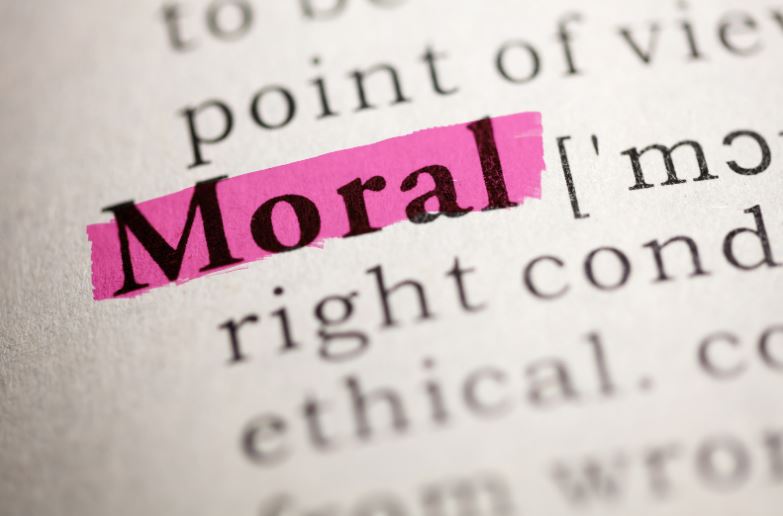Is Morality Possible Without God?

Is Morality Possible Without God?
Regardless, it’s more likely with him.

Is morality possible without God? It’s an interesting question that has divided scholars for decades, if not centuries, but it’s largely irrelevant to economists; rather, as economists, we should be asking about the tradeoffs implied by the question: namely, should we prefer a religious society or an atheist society?
Ceteris paribus a religious society must be more moral than an atheist society for the same reason and in the same way that a diversified portfolio must outperform the average managed portfolio. Let me explain:
As a rational, profit-maximizing individual, you should commit ANY misdeed for which the expected value of your success is greater than the expected value of your punishment. If, for example, you have a 10% chance of stealing $1,000,000, and a 50% chance of going to jail for a year if caught, then your expected value of success is $100,000 and your expected value of punishment is ½ whatever you consider the total costs (monetary and non-monetary) associated with spending a year in jail. Obviously, those costs vary from person to person and from time to time; indeed, you might prefer some jails to others and so on; regardless, it’s purely a personal calculation that differs for everyone.
The point here is that a religious person MUST include the value of divine punishment in their calculations, so they are always less likely to commit misdeeds than a similarly-situated non-religious person.
Religion, therefore, operates like a tax upon misdeeds. Now we can reasonably argue about the precise value of that tax, and, like the expected value of punishment, the value of this tax likely varies from person to person and time to time, but that doesn’t change our analysis: whatever this tax is, it’s non-zero, it INCREASES the cost of misdeeds, thereby reducing the number of misdeeds ceteris paribus.
It’s important to understand that this result is obvious and indisputable.
Indeed, since many misdeeds are not crimes, it’s clear that the effect of this tax is likely greatest where criminal law is not a readily available alternative to God’s final judgment. That is, I expect religion does less to deter theft than it does to deter adultery, but that would require far greater analysis and likely depends upon the individual. (Some of us might be more afraid of our wives than the criminal law!)
Now some will object that religion can promote bad things, and – of course – it could, but that would violate our original assumption of ceteris paribus. In other words, it’s reasonable to care about what sort of religion prevails in your society, but it’s not reasonable to object to religion per se. A religious society that thinks God hates Jews would be worse than an atheist society that’s fine with Jews, but the difference would be the result of anti-Semitism, not religion. What we truly want to compare (given our assumption of ceteris paribus) is a religious society that thinks God hates Jews to an atheist society that thinks Jews are evil or a religious society that thinks God loves Jews to an atheist society that loves Jews. Which is a better society? Which is better for Jews?
I think it’s clear that religion always win ceteris paribus.
After all, one could think God hates Jews, but still think his other rules would prevent or limit anti-Semitic atrocities, but what would constrain our hypothetical anti-Semitic atheists? As you can see, you have to change multiple variables at once to make the atheist society better, but then the difference is the result of those other variables, not religion.
That is, it’s safe to say that anti-Semitism is bad, but there’s no reason to think that religion makes it – or any other odious idea – worse. To the contrary, religion acts as an additional safeguard. Thus, religion might have motivated some Germans in Nazi Germany to be even worse anti-Semites, but it also motivated others to resist the Nazis; at worst, therefore, it’s an additional check and balance, albeit an imperfect one.
In economic terms, religion diversifies society in a critical way. By creating a group of people who answer to a higher authority, it requires our would-be monsters to defeat all of society’s safeguards PLUS this one additional safeguard, and how can adding an additional safeguard be bad? Sure, you might be able to persuade people that God hates Jews, and you might be able to persuade all non-religious people to hate Jews too, but it’s obviously harder to persuade everyone (both religious and non-religious) to hate Jews than it would be to persuade only the non-religious. Every barrier to uniformity of opinion that we add to society results in greater safety for everyone, particularly minorities.
Is that greater safety worth the cost?
I suppose that depends – we’ll leave it to another day. But my point is that a religious society MUST be more moral than an atheist society ceteris paribus. At the very least, religion raises the cost of misdeeds by increasing the expected value of punishment. Higher costs MUST reduce the quantity demanded; thus, religion must – as a mathematical necessity – reduce misdeeds. Furthermore, religion MUST diversify society, creating a “higher authority” that complicates any sort of societal corruption. By increasing the cost of societal corruption, religion MUST reduce the quantity demanded; thus, religion must – as a mathematical necessity – reduce societal corruption.
Granted, our assumption of ceteris paribus is inaccurate – it matters what religion(s) your society promotes, but that does not mean society should disfavor religion (or particular religions). It means that the profit-maximizing solution from a societal perspective is a general preference for religion without a specific preference for any particular religion. That is, society wants everyone to be deterred by the threat of divine punishment while making it virtually impossible to get everyone to agree on what the divine punishment for anyone else should be. Diversity is our strength, as some have said. Freedom of religion should do more to promote the general welfare than freedom from religion because the former creates diversity while the latter creates a monoculture, and, as every farmer knows, monocultures are unusually vulnerable to pestilence and disaster.
Is morality possible without God?
Perhaps, but the more important question is whether immorality is more frequent with or without him, and – on that point – the math is obvious: God is yet another barrier to those who would impose their vision upon us. And, of course, history teaches us that we need all the barriers to visionaries and their collectivist dreams that we can find because no one is quite so dangerous as he (or she) who would play God.





It is not just about tangible outcomes. The religious or spiritual person relationship with what is at worst an imaginary friend name God will lessen or increase depending on the individual’s actions. And it is that relationship that provides the context for a sense of peace, justice, and a context for further actions by the person but those affected by the person.